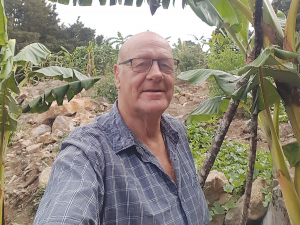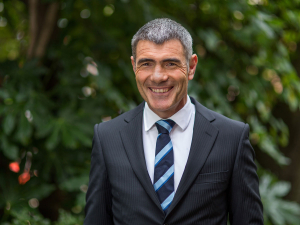Could bananas be the next big thing in New Zealand?
The fruit, associated with warm tropical climates on the equator, is proving popular with enterprising horticulturalists from Northland to Gisborne. It could even one day help NZ grow enough bananas to become self-sufficient.
The semi-tropical climate of Northland is already proving an excellent hub for a band of enthusiastic and increasingly commercially focused banana growers, working under the Tropical Fruit Growers of NZ group.
Farming on a 40ha property near Parua Bay, on Northland’s east coast, Hugh Rose, the president of Tropical Fruit Growers of NZ is growing a veritable fruit bowl of tropical produce. Varieties of exotic fruit compete for visitors’ taste-buds – pineapples, bananas, dragon fruit, pawpaw and even sugar cane.
He classes bananas as the easiest crop in the world to grow, benefitting from NZ’s low disease and pest levels compared to the tropics, and capable of producing fruit almost constantly through the year once temperatures exceed 14C.
With 17 varieties growing, there is increasing consumer interest in the NZ-sourced bananas that sell for about $8/kg at the Whangarei farmers’ market.
“And with the number of enthusiasts we now have on board, there should be enough bananas growing now for Northland to be self-sufficient in a couple of years.”
Rose’s calculations on potential earnings would make most horticulturalists sit up and take notice. He reckons that 1500 plants per hectare could yield at least 15,000kg of bananas a year. Even at $2/kg this would return $30,000/ha.
As for the sort of climate conducive to banana growing, Rose says growers are producing bananas in Invercargill. “Admittedly they’re under tunnel shelter, but there are growers throughout Northland, Bay of Plenty, and down to Gisborne all producing good crops,” he told Hort News.
As a highly water-efficient, funnel shaped plant they do not require much irrigation, grow well on most soil types and tolerate many pests and diseases.
The fruit also sits well alongside traditional pastoral activities like dairying.
“Dairy effluent is high in nitrogen and phosphate, exactly what bananas love, and the plant just sucks up those nutrients, making it an ideal crop alongside a dairy operation.”
It is also a source of cattle feed, with all the banana plant edible by stock.
Since Tropical Fruit Growers was formed, it has helped plant over 10,000 stems and plantings, coming into production over the next two years.
But for NZ to be self-sufficient in home-grown bananas it will take much more plantings, says Rose.
“We need a heck of a lot more. We have a backlog of orders but source plants are hard to obtain physically and logistically,” Rose said.
“We are all volunteers without government handouts so do our best to help others coming into the business, but we also have our own businesses to run. At the current rate of planting, I would say probably another 10-15 years before NZ becomes self-sufficient.”
Yes, we have bananas
Hugh Rose believes there are small banana plantations around Auckland run by Pacific islanders.
He says good plantations can be found between Matakana and the Far North. Some of those farms could be 50-60ha in total, he says.
“If we assume they are producing 10kg bunches and 1000 clumps/ha then the total production will be 600,000-700,000kg of fruit.
“This is a very small amount compared to what NZ consumes and all fruit is sold locally,” he said. “We have four-six regular sellers of bananas at the Whangarei farmers’ market who are sold out most Saturdays before 8am.”
NZers love the yellow fruit, chomping through 18kg per capita a year -- about $140 million worth that puts NZ at top of the global list for banana consumption.
Bayleys Whangarei horticulture and lifestyle specialist Vinni Bhula says the appealing climate and supply of smaller scale lifestyle blocks available in Northland set the region up well for produce.











